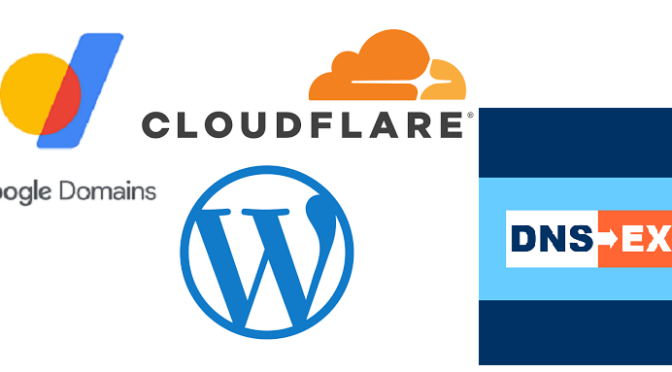WordPress vs. DNSExit vs. Cloudflare for DNS Management:
The recent move by Google to abandon their web domains division, selling their clients away to Squarespace without so much as a “by your leave, m’lord”, led to a decision to move my domain registry over to WordPress.
Why WordPress, and not Squarespace?
Well, I just didn’t like the way that deal happened. And I found the Squarespace site confounding to parse, and nail down pricing for services.
At WordPress, they made a generous offer for a free year’s hosting, and their rate matched the Goog’s $12/year per domain thereafter. They even rolled over my remaining paid months from Google, so I don’t owe them anything until summer of 2025! Nice!
But for all that economy, the migration was annoying on a number of counts.
So, what’s wrong with WordPress DNS?
First, the management of DNS at WordPress proved frustrating for a couple of reasons. I discovered that lengthy TXT records, like the 2048 bit DKIM record couldn’t be used there because of a Record limit of 255 characters. Really?! So I wasted an hour recomposing down to a 1024 bit DKIM record.
Wasted because I discovered that WordPress DNS had no means to accommodate Dynamic DNS updates. This was a total deal-breaker! All my effort at migrating DNS was a loss. I’d do better watching reruns of ‘Between Two Ferns’. I can’t imagine a DNS management host not covering that need!
The bottom line: WordPress is a good domain registry. And while very good at web hosting and support for their open-source content management tools… Well, they kind of suck at domain hosting and DNS tools.
DNSExit and Cloudflare:
For almost 15 years prior to moving my domain registry to Google, I managed DNS at DNSEXIT.com. And I’ve got to say, they were pretty fine in all respects. They have always offered a free DDNS api capable of updating an IP change, and email spooling to provide coverage for a downed email server.
I’ve also looked into and tried Cloudflare’s DNS hosting, and was impressed at the features they offer. Beyond their DDNS api, they permit crafting custom api’s for other needs. They also provide data caching to reduce your server loads, and proxied A, AAAA, and CNAME records, which allows Cloudflare to cache and guard requests to your site, and interdict DDoS attacks.
Both DNSExit and Cloudflare have free basic plans for DNS management. DNSExit is, if you ask me, the simpler and more intuitive to use, but then I did manage DNS with them for a very long time. They excel at email backup and related services. Cloudflare is more advanced at the scope of DNS services they offer, and hence has a steeper learning curve to implement them, but is well worth the effort.
Both are good choices moving forward if, like me, you’ve been expelled from the Goog’s domain!
